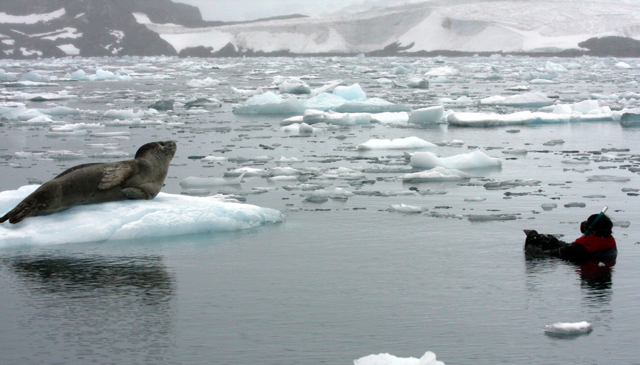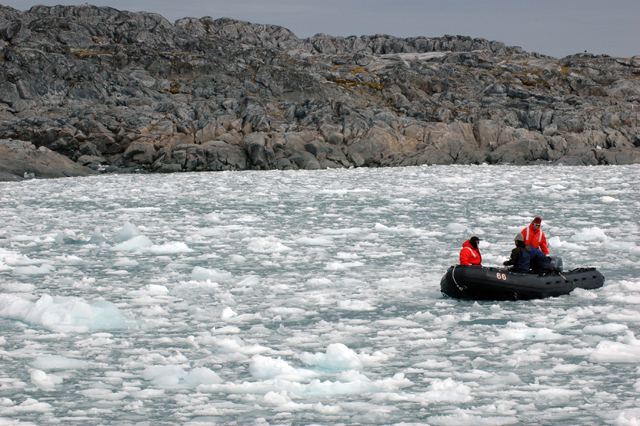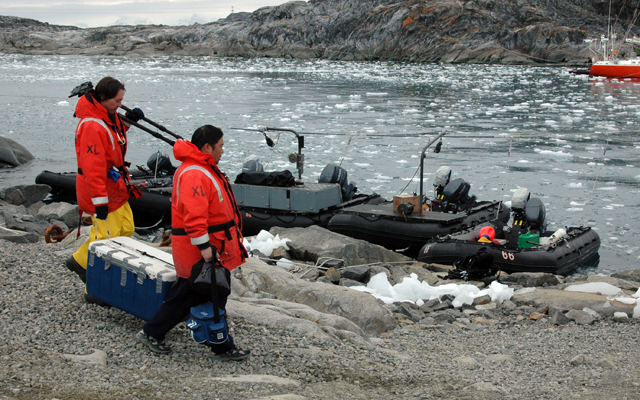Page 2/2 - Posted March 26, 2010
Antarctic art gets to 'hearts and souls of people'More Wildlife
Check out the marine environment around the Antarctic Peninsula with these YouTube videos showing some of the sights while Boating Around Palmer Station
He also made his first visit to the Antarctic Peninsula that same season in 2009-10, hoping to expand the online field guide, as well as create new material for future books and a film. This year is the last field season on his grant. After his success at McMurdo, why come back? “I wanted to see the Antarctic Peninsula,” says Wu, who had to endure a four-day crossing of the Southern Ocean from Chile to reach this remote location. (He gets extremely seasick.) “It’s very different. It’s amazing how much difference there is in marine life and visibility there is here.” Different isn’t always better. McMurdo Sound is famous for its amazingly clear water, with more than 100 meters of visibility as the rule rather than the exception. A green murkiness shrouds the underwater world near Palmer Station, making it difficult to get the dramatic shots that became iconic of Wu’s work out of McMurdo Sound. An instructor and dive guide from Seattle, Caldwell says the diving is also challenging because the team doesn’t really know what it will find at any particular spot. “You don’t have people from yesterday telling you what the dive is going to be like today. In a lot of places, you’ll get that,” observes Caldwell, who also worked with Wu in McMurdo. “It’s a lot more exploratory diving. When you get to a site, you don’t know what you’re going to see.” Caldwell says he hopes the work produced here will spur interest in not only the Antarctic but conservation issues as well. The science is important, he says, but programs like those produced by Wu and the BBC get to “the hearts and souls of people.” “I’m amazed by the work we did in McMurdo … being a part of it makes me feel proud of what I’ve done, what I’ve worked for. I love this and I don’t ever want it to go away,” he says, gesturing to the ocean, the icebergs, penguin colonies on distant islands, “and it’s deteriorating quickly. Outreach is definitely very important.” Wu knows he has to tell a dramatic story in images and film to capture those hearts and souls. One of his goals this season is to film predation of penguins by leopard seals — large, sharp-toothed carnivores with reptilian heads that have been known to chew on the Zodiac’s inflatable pontoons. He got his wish on a different day, when he and Caldwell found a leopard shaking a penguin like a dog with a chew toy. Later, sated by the meal, the leopard lounged on an ice floe. Wu jumped in the water to film some additional footage after only minutes before watching the power of the spotted predator. “I think long and hard about dangerous situations the older I’ve gotten,” he admits. “I used to jump in with stuff all the time — alligators or whatever.” The 48-year-old photographer isn’t necessarily slowing down, but after years of crisscrossing the world, he’s learned to savor some experiences over others. “I’m more selective about what I get excited about,” Wu says. “It really is the journey than what you see in a lot of ways.” NSF-funded research in this story: Norbert Wu, Norbert Wu Productions, Award No. 0732907 |



For USAP Participants |
For The Public |
For Researchers and EducatorsContact UsNational Science FoundationOffice of Polar Programs Geosciences Directorate 2415 Eisenhower Avenue, Suite W7100 Alexandria, VA 22314 Sign up for the NSF Office of Polar Programs newsletter and events. Feedback Form |




